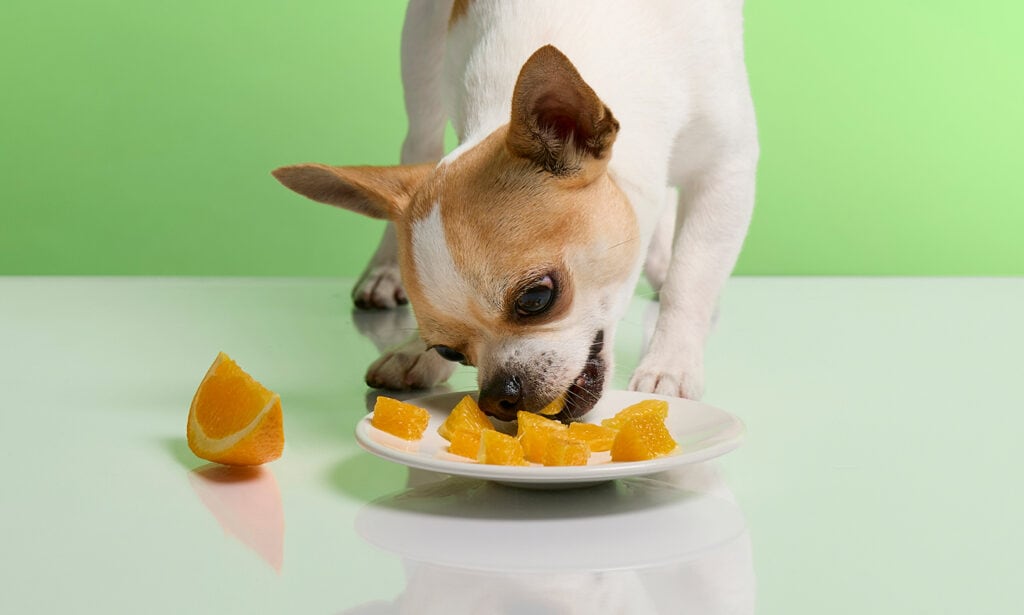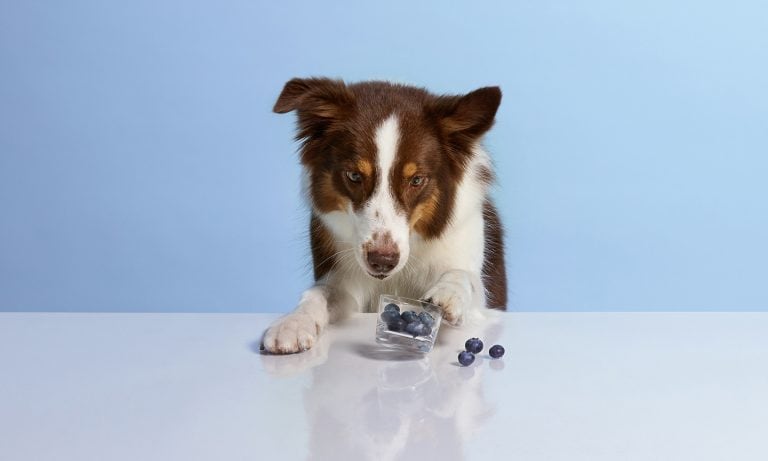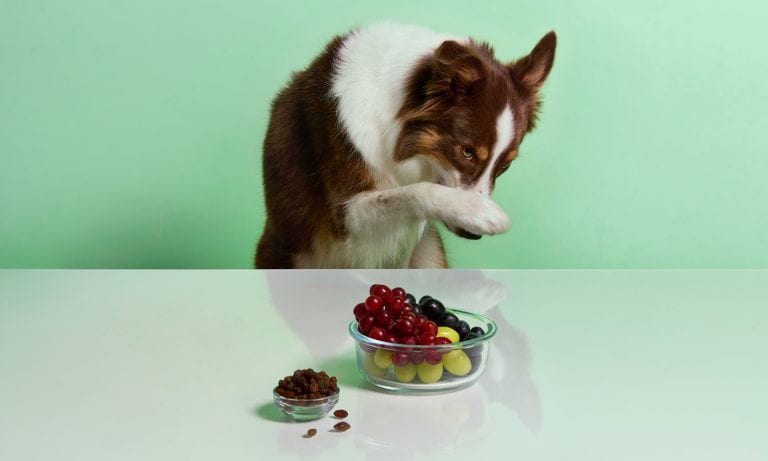Oranges, brimming with juicy goodness and plentiful vitamin C, are a staple in many people’s fruit bowls. They’re celebrated for their acidic, yet sweet flavor and immune-boosting benefits—but can dogs eat oranges, too?
Yes, oranges are one of many fruits dogs can enjoy in moderation. And all types of oranges are fair game, including mandarin, clementine, tangerine, satsuma and navel. But there are important caveats to consider.
We spoke to a vet expert to get all the juicy details about dogs and oranges.
Expert input provided by Dr. Desiree Luevano, DVM, owner and medical director of GoodVets in Dallas.
Can Dogs Eat Oranges?
Click to jump to each section.
Should Dogs Eat Oranges?
While dogs can eat oranges, the question of whether they should is more nuanced.
Oranges are, indeed, non-toxic to dogs and can even offer some health benefits. However, unlike humans, dogs naturally produce vitamin C in their liver, which means additional amounts from their diet are usually unnecessary.
Moreover, because commercial dog foods are formulated to be nutritionally complete, your dog typically won’t need extra vitamins or nutrients from oranges. However, if your four-legged pal eagerly eyes this citrus delight, a modest portion can be a safe indulgence.
Benefits of Oranges for Dogs
Oranges may not be an essential part of a canine diet, but they can offer some benefits when given as a treat in moderation.
Here are a few paw-sitive aspects of feeding your dog this citrus fruit.
Nutritional Value
Oranges are known for their high vitamin C content.
While your pup can synthesize their own vitamin C, an extra boost from oranges during times of stress or illness may help support your dog’s immune system.
Oranges also offer potassium, fiber, some B vitamins and antioxidants, which can support a healthy immune system, a healthy coat, disease prevention and overall wellness.
Dietary Fiber
Oranges contain dietary fiber, which can aid in digestion and help regulate bowel movements.
For dogs who may suffer from occasional constipation, a little bit of orange or other fruit might help get things moving.
Hydration
With their high water content, oranges can be a hydrating snack. On hot days or after exercise, a juicy orange segment might be a refreshing way to help your dog stay hydrated, especially if they’re finicky about drinking water.
Low-Calorie Treat
Oranges can be a low-calorie, healthy treat option for overweight dogs who enjoy the taste of oranges. This makes them a suitable choice for owners who are watching their pet’s calorie intake, as long as they are given in small amounts.
Risks of Oranges for Dogs
While oranges can offer your dog some sweet benefits, their inclusion in a canine diet is not without its risks, potentially introducing a few sour repercussions to your dog’s health and well-being.
Let’s take a look at the components of oranges that can potentially cause problems for dogs.
Sugar Content
Oranges have relatively high sugar content, and excessive sugar intake can lead to obesity and dental problems in dogs.
Oranges can also be problematic for diabetic dogs or those at risk of the disease, as excessive sugar intake can disrupt blood sugar regulation.
Citric Acid
The citric acid in oranges is not harmful to dogs in small quantities, but in larger amounts, it can cause an upset stomach.
Symptoms may include vomiting, diarrhea or a decreased appetite. Dogs with sensitive stomachs may experience these symptoms even with small amounts of oranges.
Peel and Seeds
The peel and seeds of oranges contain chemicals called psoralens. These chemicals are also found in small amounts in the flesh.
Psoralens can induce skin sensitivity to sunlight, which might lead to redness or irritation after your pup enjoys a sunny day outside.
To keep snack time safe and enjoyable, ensure your dog only nibbles on the orange flesh, steering clear of the rest.
The peel is also a choking hazard, as it can become lodged in a dog’s throat or intestinal tract. This obstruction can be fatal if not promptly treated.
Lastly, some essential oils found in the peel, namely limonene and linalool, can be toxic to dogs if ingested in large quantities.
High Fiber
While fiber is beneficial for a dog’s digestion in moderate amounts, an excess can be troublesome.
High fiber intake can lead to digestive issues, such as diarrhea, bloating and gas.
How to Feed Oranges to Dogs
Feeding your dog oranges can be a sweet treat when done mindfully. Here’s the best way to safely introduce this citrus fruit into your furry friend’s diet:
Preparing the Orange
- Peel and seed: Always start by thoroughly peeling the orange. Remove all traces of peel, pith and seeds.
- Cut it up: Cut the orange into manageable, bite-size pieces. This reduces the risk of choking and helps you control the portion size.
Portion Control by Size
How many orange slices can you give your dog? For dogs with no underlying medical issues, the following daily portions are appropriate:
- Small dogs (10-20 pounds): Half a segment from a medium-size orange
- Medium dogs (20-60 pounds): 1-2 segments from a medium-size orange
- Large dogs (60 pounds and above): 2-3 segments from a medium-size orange
Frequency and Moderation
Even though orange flesh is safe for dogs, they should be considered a treat, not a dietary staple.
Treats, whether they’re oranges or other snacks, should not make up more than 10 percent of your dog’s daily calorie intake.
It’s best to introduce oranges gradually and observe how your dog reacts. If they experience any symptoms of discomfort, refrain from giving your dog more orange, and check in with your veterinarian.
Other Dog-Safe Fruits
Oranges are not the only fruit dogs can enjoy. There is a variety of other fruits that can be healthy snacks in moderation. These include:
- Apples
- Blueberries
- Blackberries
- Raspberries
- Strawberries
- Bananas
- Watermelon
- Cantaloupe
- Mango
- Pears
- Peaches (avoid the pit, which is toxic)
- Pineapple
- Cranberries
- Kiwi
When treating your dog to these safe fruits, always remember to:
- Introduce new fruits into your dog’s diet gradually to avoid GI upset.
- Wash the fruit thoroughly to remove pesticides or chemicals.
- Remove all seeds, pits, and inedible skins or rinds to prevent choking or intestinal blockage.
- Consult your veterinarian before introducing any new foods to your dog’s diet, especially if your dog has existing health conditions or dietary restrictions.
FAQs About Oranges and Dogs
Q:
Can dogs eat mandarin oranges?
Q:
Why would a dog eat an orange?
A:Dogs may be enticed to eat an orange due to its sweet smell and taste. Some dogs enjoy the novelty and texture, while others may be drawn to the fruit’s juiciness, especially on a hot day.
That being said, oranges likely won’t top the list of preferred snacks for most dogs, but if your furry pal shows interest in this citrus fruit, it can be a safe and occasional treat, provided it’s prepared correctly.
Q:
Can my dog eat orange peels?
Q:
Can dogs have orange juice?
Q:
Are any fruits toxic to dogs?
More human foods dogs can eat:
Share:













